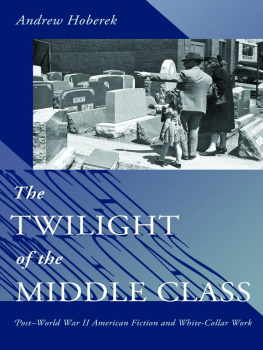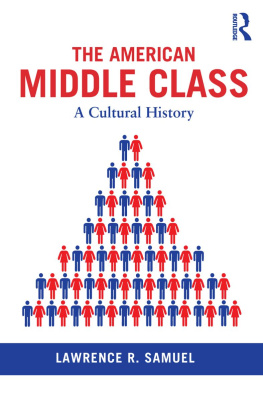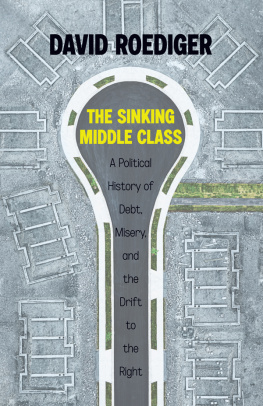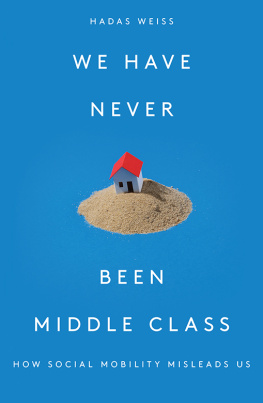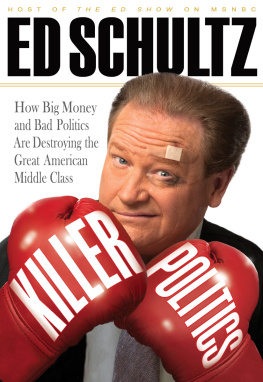The Twilight of the Middle Class
The Twilight of the Middle Class
POSTWORLD WAR II AMERICAN FICTION AND WHITE-COLLAR WORK
Andrew Hoberek
PRINCETONUNIVERSITYPRESS
PRINCETONANDOXFORD
Copyright 2005 by Princeton University Press
Published by Princeton University Press, 41 William Street, Princeton, New Jersey 08540
In the United Kingdom: Princeton University Press,
3 Market Place, Woodstock, Oxfordshire OX20 1SY
All Rights Reserved.
Library of Congress Cataloging-in-Publication Data
Hoberek, Andrew, 1967
The twilight of the middle class: postWorld War II American Fiction and white-collar work/Andrew Hoberek.
p.cm.
Includes bibliographical references (p.) and index.
eISBN: 978-1-40082-681-0
1. American fiction20th centuryHistory and criticism. 2. Middle class in literature. 3. Literature and societyUnited StatesHistory20th century. 4. World War, 19391945United StatesLiterature and the war. 5. White collar workers in literature. I. Title
PS374.M494H63 2005
813'.54093552dc222004062441
British Library Cataloging-in-Publication Data is available.
This book has been composed in Garamond
Printed on acid-free paper.
pup.princeton.edu
Printed in the United States of America
10 9 8 7 6 5 4 3 2 1
For Audrey, who taught me to love books and history,and Natch, who taught me to think about work
Contents
Acknowledgments
THIS BOOKappropriately for one concerned with critiquing individualizing models of mental laborwould have been very different without the work put into it by other people. In its earliest stages, I presented portions of this project to the American Studies and Mass Culture workshops at the University of Chicago. More recently, chapters have benefited from the thoughtful attention of the members of the Missouri Americanist Group: Richard Callahan, John Evelev, Mark Gallagher, Mo Lee, Richard Lester, Catherine Rymph, Kristin Schwain, Jeffrey R. Williams, Paul Young, and especially Frances Dickey. Others who have read and commented on chapters include Jennifer Burns, John Burt, Tracy Floreani, Maria Farland, Amy Hungerford, Cathy Jurca, Michael Kreyling, Stacey Margolis, Lee Medovoi, Tim Melley, Chris Newfield, Stacey Olster, Susan Radomsky, Bruce Robbins, Peter Sattler, Michael Szalay, Michael Trask, Ken Warren, Fred Whiting, and Christopher Wilson. Rachel Adams, Sean McCann, and Walter Benn Michaels read the whole manuscript and offered trenchant advice. Much of what is worthwhile in this book is due to these people, while its faults are chargeable only to me.
This project benefited in its infancy from the thoughtful guidance of Bill Brown and Chris Looby. It would have been impossible without the contributions of Gerald Graff, who was not only my dissertation advisor but also my boss in the University of Chicagos Master of Arts Program in the Humanities and who, Im happy to say, remains my friend. Under Jerrys tutelage I learned to write for an audience, to not take myself too seriously, and to be kind. The academy would be a better place if there were more people like Jerry in it.
Among my many excellent colleagues at the University of Puget Sound and the University of Missouri, Tim Materer merits special mention: I couldnt imagine a better senior colleague. Students at MU whove taught me as much as Ive taught them include Andy Heisel, Lania Knight, Michael Piafsky, Jeremy Reed, and Ramsay Wise. Jason Arthur belongs in this category, as well, although he gets his own sentence for his invaluable assistance with the manuscript. Joe Scott helped out with the research. Im grateful to the University of Missouri Research Board for a fellowship that enabled me to spend a year working on this project.
In what have been difficult times for young academics trying to publish first books, I was lucky to have Mary Murrellan editor whose work I already admiredtake an interest in this project. My sadness at Marys departure from Princeton University Press before this books completion has been offset by the pleasure of working with Hanne Winarsky, Carmel Lyons, and my excellent copy-editor, Jonathan Munk. Patrick ODonnell and Marshall Brown gave me boosts early in my career by publishing my first articles. An earlier version of my chapter on Ralph Ellison appeared under the same title in Modern Language Quarterly 59.1 (March 1998); I am grateful for permission to include the revised version here.
Shoshannah Cohen, Brad Prager, and Dave Stewart have been friends in good times and bad, at work and play, nearby and at (too great) a distance. Natch Hoberek, Audrey Hoberek, Dawn Hoberek, Jody Hoberek-Atkins, Tom Atkins, Barbara Chu, Sandi Chu, and Derek Lustig have been... well, family.
Pride of place in these acknowledgments goes to Pat Chu. For fifteen years Pat has been my partner in every sense of the word. Im not entirely sure how I ended up with someone so smart, beautiful, and willing to indulge my goofy side, but Im not asking any questions.
The Twilight of the Middle Class
INTRODUCTION
The Twilight of the Middle Class
... privileged and deprived, an American sort of thing.
Don DeLillo, Underworld (1997)
MORRIS DICKSTEIN POSES his recent study of postWorld War II American fiction Leopards in the Temple (2002) as a corrective to the by now standard tendency to emphasize the cold war in accounts of this period. While they differ on how to interpret the shift from economics to psychologyfrom capitalism and class struggle to psychological nuance and linguistic complexity (Dickstein 20)Dickstein and critics like Schaub agree that this shift is the defining characteristic of postwar fiction.
It is perhaps for this reason that critics of cold war culture themselves downplay the very questions of economics and class consciousness for whose omission they take postwar writers to task. We might expect these critics to see Dicksteins more neutral, and at times even celebratory, account of this shift as continuous with cold war triumphalisma latter day version of Richard Nixons economic boosterism in his 1959 kitchen debate with Nikita Kruschev.
This book argues, by contrast, that economics and class remained central to postwar writing, belying our standard assumptions about the irrelevance of such matters in the postwar period. Of course, there is good evidence for these assumptions. Statistics compiled by the business historian Jeffrey Madrick make it clear that the postwar years were indeed prosperous ones, and not just in comparison with the lean years of the Depression. Along with the fact that family incomes doubled... between 1947 and 1973,
By 1970 four out of five American families owned at least one car, two out of three had a washing machine, and almost all families had a refrigerator. About 65 percent of American families owned their own homes, and almost all had flush toilets and running water. The proportion of white males who had graduated from college rose from 6 percent in 1947 to 11 percent in 1959 and to about 25 percent in the 1980s. More than half of working Americans had a private pension, compared with only about 15 percent after World War II, supplementing Social Security benefits, which themselves were only a generation old.
As Paul Krugman and others have noted, moreover, the postwar economy not only grew at a remarkable rate, but its fruits wereby the standards of either pre-Depression America or our own timeremarkably evenly distributed.
Given such real and relatively widespread prosperity, the elision of economic matters in accounts of postwar writing seems understandable. As early as 1962, to be sure, Michael Harrington had called into question the assumption that the basic grinding economic problems had been solved in the United States. But while such revisionist accounts usefully remind us that not everyone in the fifties had equal access to the fruits of the economic boom, they leave untouched our sense that those who did have such access somehow transcended the economic realm.
Next page
